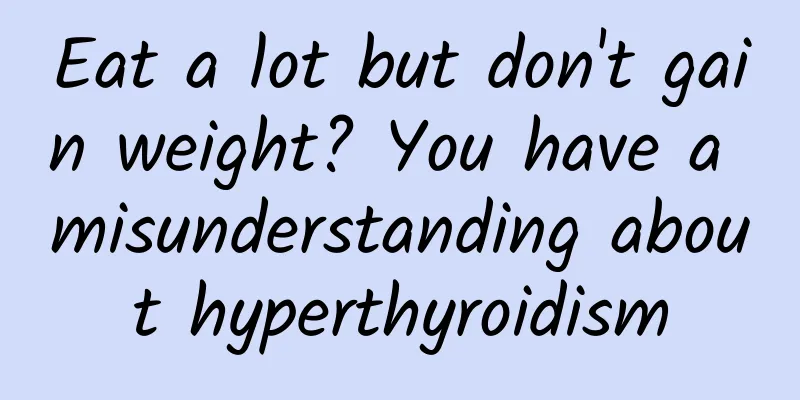Eat a lot but don't gain weight? You have a misunderstanding about hyperthyroidism

|
There are always a group of people around us who usually eat a lot, eat a lot of snacks and drinks, but are very slim. Friends around them envy them and ask: You eat a lot but don’t gain weight, do you have hyperthyroidism? ! What's the relationship between a baby's good appetite and hyperthyroidism? For example, some guys who exercise regularly and have well-developed neck muscles will occasionally hear some unromantic questions: Your neck is so thick, do you have hyperthyroidism? ! What? Baby, this is clearly the trapezius muscle, okay? ——"I have a bad temper!" ——"You have hyperthyroidism?!" Does a bad temper mean hyperthyroidism? When it comes to hyperthyroidism, most people are familiar with it, and have even heard of some typical symptoms of hyperthyroidism, such as not gaining weight despite eating a lot, goiter, and irritability. Unfortunately, most people only have a superficial understanding of thyroid diseases such as hyperthyroidism, but lack basic knowledge of the clinical diagnosis, hazards and prevention of hyperthyroidism. Hyperthyroidism: Do you really understand it? Hyperthyroidism is a clinical syndrome in which the thyroid gland synthesizes and secretes too much thyroid hormone, causing increased excitability of the nervous, circulatory, and digestive systems and hypermetabolism. The synthesis and secretion of thyroid hormones are the responsibility of the thyroid gland (Thyroid), which is an important endocrine organ in the human body. It is located below the thyroid cartilage in the neck, i.e. the Adam's apple, on both sides of the trachea, and is shaped like a butterfly, like a shield. Thyroid gland (picture from the Internet) In contrast to hyperthyroidism, hypothyroidism (commonly known as "hypothyroidism") is a clinical disease caused by impaired thyroid function, resulting in low levels of thyroid hormone secreted into the blood . Data from the "Epidemiological Survey of Thyroid Diseases among Community Residents" recently released by my country show that the prevalence of hyperthyroidism in China is 1.3% (about 17 million people). Among them, about 70% of hyperthyroidism patients need medication, and the prevalence of hypothyroidism is 6.5% (about 80 million people). According to the data of the "Ten Cities Thyroid Disease Epidemiological Survey Results" published by the Endocrinology Branch of the Chinese Medical Association, as many as 6.5% of the population in 10 urban communities including Beijing, Chengdu, Guangzhou, Guiyang, Jinan, Nanjing, Shanghai, Shenyang, Wuhan, and Xi'an suffer from hypothyroidism (including clinical hypothyroidism and subclinical hypothyroidism, hereinafter referred to as "hypothyroidism"), and 18.6% of the population suffer from thyroid nodules. It can be seen that the health status of the thyroid gland is not optimistic. The above-mentioned symptoms of not gaining weight despite eating a lot, a thick neck, and a bad temper are certainly the basic clinical symptoms of hyperthyroidism. However, for healthy people, a high basal metabolic rate, muscle building through fitness, or high social pressure are often the main causes of the above conditions. To make a more scientific judgment on hyperthyroidism, we must start with the causes of hyperthyroidism. Symptoms of hyperthyroidism: Not just eating a lot but not gaining weight The manifestations of hyperthyroidism vary from person to person. Increased thyroid hormone can promote energy metabolism, lower cholesterol levels, enhance fat metabolism, and promote glucose synthesis . The clinical manifestation is weight loss . For those who pursue delicious food and want to be slim, eating a lot and not gaining weight is a dream come true. In this sense, hyperthyroidism seems to be acceptable. However, the human body is like a finely tuned instrument, and any slight disturbance may have a huge negative impact on the final performance of the instrument. In fact, in addition to causing weight loss, there are many other symptoms of hyperthyroidism: Symptoms of hyperthyroidism (picture from the Internet) Hypermetabolic syndrome: fatigue, heat intolerance, sweating, and rapid weight loss. Mental and nervous system: hyperactivity, nervousness, anxiety, irritability, etc., occasionally with apathy, silence and depression. Cardiovascular system: palpitations, chest tightness, shortness of breath, and severe cases may cause heart disease. Digestive system: increased appetite, weight loss after eating too much, increased bowel movement frequency, loose stools; elderly patients have decreased appetite and anorexia; more serious cases have enlarged liver, abnormal liver function, and occasionally jaundice. Musculoskeletal system: Occasionally, patients may be unable to climb stairs, squat or stand up from a sitting position, become emaciated or even suffer from muscle atrophy and osteoporosis. Reproductive system: Women experience decreased menstruation or amenorrhea; men experience impotence and occasionally breast hyperplasia. Hematopoietic system: Mild anemia, low white blood cell count. Physical signs: enlarged thyroid gland, thickened neck, exophthalmos, etc. The synthesis of thyroid hormones requires the participation of thyroglobulin and iodine . Iodine mainly comes from food, is absorbed through the small intestine and transported to the thyroid cells, and catalyzes a reaction with thyroglobulin to form tetraiodothyronine (T4) and triiodothyronine (T3). T3 can be converted by T4, and its activity is much greater than that of T4. In a normal human body, there are two hormones - thyrotropin-releasing hormone (TRH, secreted by the hypothalamus) and thyroid-stimulating hormone (TSH, secreted by the pituitary gland), and their content needs to be regulated by the hypothalamus-pituitary-thyroid axis system. After receiving the TSH signal, the thyroid gland releases T4 and T3 into the blood, enters fat, muscle tissue, liver and pancreas, and regulates the body's metabolism. Therefore, when conducting a hyperthyroidism diagnosis project, testing the levels of TSH and thyroid hormones T3 and T4 in the serum can determine the final content of thyroxine, thereby preliminarily determining whether there is any abnormality in thyroid function. Symptoms and dangers of hyperthyroidism Many studies have shown that environmental and genetic factors can lead to increased secretion of thyroid hormones. According to the cause, it can be divided into: Hyperthyroidism This is caused by the thyroid gland's own hyperfunction and includes diffuse goiter (Graves' disease), multinodular goiter, autonomous hyperfunctioning thyroid adenoma, iodine-induced hyperthyroidism, and follicular thyroid cancer. Graves' disease is the most common. It is a multi-system syndrome with the main manifestations of hypermetabolism, thyroid enlargement and exophthalmos. The autoantibodies produced by Graves' disease can bind to TSH receptors, causing the thyroid gland to produce too much thyroid hormone. The cause of the disease is still unclear, but it may be related to genetic factors. Studies have shown that if one twin is sick, the other twin has a 17%-35% chance of getting sick. Environmental factors such as stress, infection, thyroid damage, and vitamin D and selenium deficiencies are also factors in the disease. Iodine is the main raw material for the synthesis of thyroid hormones. Too much or too little iodine directly affects the synthesis and secretion of thyroid hormones. Excessive iodine can cause goiter, and people in iodine-deficient areas will experience this symptom after taking iodine supplements. Long-term excessive iodine may lead to hypothyroidism. Correspondingly, iodine deficiency affects the synthesis of thyroid hormones, reducing the iodine content in the blood. Through the negative feedback regulation mechanism of the hypothalamus-pituitary-thyroid axis, it promotes the secretion of hypothalamic TRH and pituitary TSH, causing the proliferation of thyroid epithelial cells and the increase of thyroid volume, and finally turning into functional autonomous thyroid nodules. In addition, iodine deficiency during pregnancy or in the early days of life can cause endemic cretinism, the main manifestations of which are intellectual disability, deaf-muteness and slow growth and development. If the drug iodine, which is used to treat arrhythmia, is taken improperly, it can induce hyperthyroidism or directly suppress the function of the thyroid gland. Pituitary hyperthyroidism It is caused by excessive secretion of TSH by the pituitary gland. Most cases are caused by pituitary tumors, and a few are caused by hypothalamic-pituitary dysfunction. Concomitant hyperthyroidism One type is hyperthyroidism associated with tumors, such as choriocarcinoma, lung cancer and digestive system cancer, which secrete TSH-like substances and cause hyperthyroidism. The second is ovarian thyroid with hyperthyroidism. Ovarian teratocarcinoma contains thyroid tissue. If excessive thyroid hormone is secreted, it will cause hyperthyroidism. The third is hyperthyroidism during pregnancy. Due to the changes in hormone levels in the body during pregnancy, the thyroid gland enlarges. The main manifestations are high metabolic states such as intolerance to heat, sweating, increased appetite, and accelerated heart rate. Latent or apathetic hyperthyroidism There are no obvious symptoms such as goiter, weight loss or exophthalmos, which are more common in elderly patients. Patients show apathy, lack of energy, slow reaction, decreased appetite and arrhythmia. Excessive secretion of thyroid hormones, but less T3 and T4 in the blood. In addition, there is a special type of hyperthyroidism - thyroid storm, in which the thyroid gland is extremely active and may cause life-threatening complications. This symptom accounts for about 1-5% of hyperthyroidism patients hospitalized for treatment. The main manifestations are fever, arrhythmia, vomiting, diarrhea, etc. Its treatment must be multi-pronged, reducing the synthesis and release of thyroid hormones, reducing the effects of thyroid hormones on the extremities, etc. Clinically, the classification of hyperthyroidism can be determined by thyroid 131I uptake rate, thyroid stimulating immunoglobulin (TRAb) assay and thyroid ultrasound examination. Treatment of hyperthyroidism If hyperthyroidism has been diagnosed, it is not a big deal. Proper rest, avoiding mental stimulation, and taking in enough calories and nutrition can control or cure the disease. There are currently three basic treatment methods, which are mature and have few side effects: Antithyroid drug treatment, commonly used drugs are propylthiouracil and methimazole, which mainly inhibit thyroid peroxidase, hinder iodine oxidation and tyrosine coupling, and inhibit the synthesis of T4 and T3. In comparison, methimazole treatment has a longer half-life, fewer side effects and better therapeutic effect. Drug therapy is relatively conservative and is often used to treat Graves' disease, but it is ineffective for treating toxic thyroid adenomas and toxic thyroid nodules with hyperthyroidism. Since this method is prone to recurrence after stopping the drug, it is recommended to perform thyroid function tests 4-6 months after taking the drug, and re-examine it after 2-3 months if the test is normal. In addition, about 5% of patients experience side effects such as pruritus, joint pain and gastrointestinal discomfort, and a very small number of patients will experience liver damage. Radioactive iodine therapy: Utilizing the thyroid gland's high ability to accumulate iodine and the biological effect of iodine-131 releasing beta rays, the ionizing radiation in the thyroid tissue destroys glandular cells, reducing the synthesis and release of thyroid hormones to treat hyperthyroidism. This method is safe and most cost-effective, and is applicable to all types of hyperthyroidism except Graves' hyperthyroidism. However, women who are preparing for pregnancy, pregnant, or breastfeeding should use it with caution. Although side effects are extremely rare, about 1% of treated patients develop acute thyroiditis. Surgical treatment: The majority of the thyroid gland is surgically removed to directly reduce the thyroid tissue and treat hyperthyroidism. It is suitable for thyroid cancer patients with enlarged thyroid gland and low iodine uptake rate. The main side effect is hypocalcemia caused by hypoparathyroidism. Prevention is better than cure. For healthy people, it is more important to prevent the occurrence of hyperthyroidism. The main preventive measures are as follows: Good living habits and moderate physical exercise can enhance the body's immune ability. Pay attention to controlling the iodine content in the diet. Do not consume too much iodine in coastal areas, and supplement iodine moderately in the diet in inland areas. Maintain a regular life, combine work and rest, and keep a good mood and a happy spirit. Are friends who eat more and lose weight due to hyperthyroidism? In fact, factors that affect weight loss are not only hyperthyroidism, but more importantly, they are related to genetic factors, living habits, dietary structure, digestion and absorption system, nervous and emotional factors, exercise, etc. Therefore, hyperthyroidism is not a guardian angel for not gaining weight even if you eat a lot, nor can it be diagnosed simply by eating more and losing weight. It requires a professional medical institution to make a professional diagnosis through various physiological indicators. References: Simone De Leo, Sun Y Lee, and Lewis E Braverman. Hyperthyroidism. Lancet. 2016 August 27; 388(10047): 906–918. doi:10.1016/S0140-6736(16)00278-6. |
<<: What is the difference between iodine and iodine tincture? Which is better?
>>: Smoking is harmful to health, but why is it so difficult to quit smoking?
Recommend
Festival Knowledge | May the Double Ninth Festival be auspicious every year
The ancients defined "nine" as a "...
How long does it usually take for lochia to be discharged after cesarean section?
Postpartum lochia occurs in all women after givin...
Back pain at 11 weeks of pregnancy
Pregnancy is a very difficult process for women, ...
“Hand tremors” are Parkinson’s? Not related to young people? These claims are unreliable!
April 11 is the 26th World Parkinson's Day. W...
As flu season approaches, how should we get vaccinated?
Produced by: Science Popularization China Author:...
What health tonic medicine should I take after abortion?
After an abortion, a woman's physical conditi...
A must-read for kidney patients on dialysis: How to effectively control high blood pressure, 5 methods worth learning!
For patients on dialysis, effective control of hi...
How long after abortion should I have a follow-up checkup?
I had an abortion before, so I know how much harm...
Eyeliner tattoo 1 to 7 days pictures
Nowadays, many people feel that their eyes are no...
When is the time for pre-pregnancy check-up? What should I pay attention to?
As a female friend who is about to become a mothe...
What breed is Yuan Song's dog? How much does the same dog as the male lead in Next Stop Is Happiness cost?
Yuan Song, the male lead played by Song Weilong i...
Why is the vaginal discharge yellow and has a foul smell?
The human body excretes a lot of things, such as ...
Shareaholic: Pinterest surpassed Yahoo to become the fourth largest source of organic traffic in August 2012
Pinterest has surpassed Yahoo to become the fourt...
How to treat menopausal skin itching
Menopause usually occurs around the age of 50, an...
The amniotic fluid is a bit cloudy
The amniotic fluid is a little turbid. This is a ...









